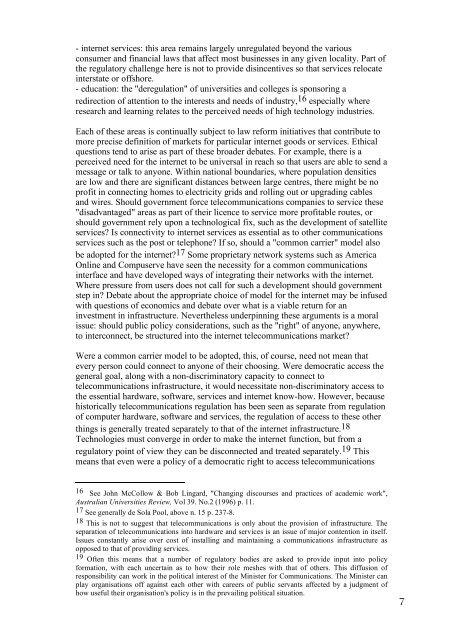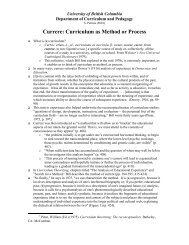ETHICAL BOUNDARIES AND INTERNET CULTURES
ETHICAL BOUNDARIES AND INTERNET CULTURES
ETHICAL BOUNDARIES AND INTERNET CULTURES
You also want an ePaper? Increase the reach of your titles
YUMPU automatically turns print PDFs into web optimized ePapers that Google loves.
- internet services: this area remains largely unregulated beyond the various<br />
consumer and financial laws that affect most businesses in any given locality. Part of<br />
the regulatory challenge here is not to provide disincentives so that services relocate<br />
interstate or offshore.<br />
- education: the "deregulation" of universities and colleges is sponsoring a<br />
redirection of attention to the interests and needs of industry, 16 especially where<br />
research and learning relates to the perceived needs of high technology industries.<br />
Each of these areas is continually subject to law reform initiatives that contribute to<br />
more precise definition of markets for particular internet goods or services. Ethical<br />
questions tend to arise as part of these broader debates. For example, there is a<br />
perceived need for the internet to be universal in reach so that users are able to send a<br />
message or talk to anyone. Within national boundaries, where population densities<br />
are low and there are significant distances between large centres, there might be no<br />
profit in connecting homes to electricity grids and rolling out or upgrading cables<br />
and wires. Should government force telecommunications companies to service these<br />
"disadvantaged" areas as part of their licence to service more profitable routes, or<br />
should government rely upon a technological fix, such as the development of satellite<br />
services? Is connectivity to internet services as essential as to other communications<br />
services such as the post or telephone? If so, should a "common carrier" model also<br />
be adopted for the internet? 17 Some proprietary network systems such as America<br />
Online and Compuserve have seen the necessity for a common communications<br />
interface and have developed ways of integrating their networks with the internet.<br />
Where pressure from users does not call for such a development should government<br />
step in? Debate about the appropriate choice of model for the internet may be infused<br />
with questions of economics and debate over what is a viable return for an<br />
investment in infrastructure. Nevertheless underpinning these arguments is a moral<br />
issue: should public policy considerations, such as the "right" of anyone, anywhere,<br />
to interconnect, be structured into the internet telecommunications market?<br />
Were a common carrier model to be adopted, this, of course, need not mean that<br />
every person could connect to anyone of their choosing. Were democratic access the<br />
general goal, along with a non-discriminatory capacity to connect to<br />
telecommunications infrastructure, it would necessitate non-discriminatory access to<br />
the essential hardware, software, services and internet know-how. However, because<br />
historically telecommunications regulation has been seen as separate from regulation<br />
of computer hardware, software and services, the regulation of access to these other<br />
things is generally treated separately to that of the internet infrastructure. 18<br />
Technologies must converge in order to make the internet function, but from a<br />
regulatory point of view they can be disconnected and treated separately. 19 This<br />
means that even were a policy of a democratic right to access telecommunications<br />
16 See John McCollow & Bob Lingard, "Changing discourses and practices of academic work",<br />
Australian Universities Review, Vol 39. No.2 (1996) p. 11.<br />
17 See generally de Sola Pool, above n. 15 p. 237-8.<br />
18 This is not to suggest that telecommunications is only about the provision of infrastructure. The<br />
separation of telecommunications into hardware and services is an issue of major contention in itself.<br />
Issues constantly arise over cost of installing and maintaining a communications infrastructure as<br />
opposed to that of providing services.<br />
19 Often this means that a number of regulatory bodies are asked to provide input into policy<br />
formation, with each uncertain as to how their role meshes with that of others. This diffusion of<br />
responsibility can work in the political interest of the Minister for Communications. The Minister can<br />
play organisations off against each other with careers of public servants affected by a judgment of<br />
how useful their organisation's policy is in the prevailing political situation.<br />
7

















